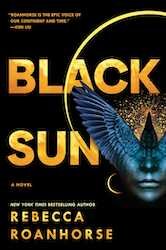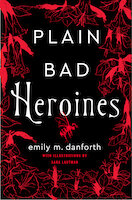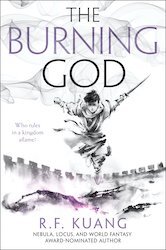Review: My Heart Is a Chainsaw
/5 stars. Every time I finish a SGJ book I gasp. Then I cackle loudly in utter delight like an evil villain. His are the books that leave me unquestionably, thoroughly, deeply (and disturbingly?) satisfied. He's so, so, so, so, smart when it comes to writing these dark, heartfelt tributes to the horror genre and this one has to be up there in terms of my personal favorites. Jade has a fantastic voice and I really felt - and rooted - for her, in all her fierce and colorful glory. There's something so beautiful and emotional and touching about this story, something I recognize now as distinctly SGJ. It surprised me in The Only Good Indians, but I dove in ready here. Fucking legendary, mate.
My Heart is a Chainsaw... well, let's see. It's about a girl named Jade, failed and forgotten and feisty and a huge fan of horror. Slashers, specifically. They give her comfort and offer an escape from her small town life of poverty, betrayal and hardship. She's lonely, with only Michael and Jason and Freddy to keep her company. She uses the narratives and tropes she knows and loves so well to frame her own world and narrate her life, much to the amusement and judgment of her teachers, family and local law enforcement. She's seen an outcast. A loner. A weirdo.
But then something starts happening in her town. Suspicious deaths. Blood in the water. And Jade starts to sense that her love of slashers, her knowledge of the rules and the twists and turns, have landed her in a uniquely suited position to actually deal with one that is actually happening in front of her. All the ingredients have landed: the final girl, the red herrings, the blood sacrifice - now it's up to Jade to nudge things along. And nudge she does, till we hit one of the most electrifying, gruesome, heart wrenching third acts I've ever read.
SGJ understands why the father and son dinner table scene is so crucial in Jaws. My Heart is a Chainsaw is an incredibly graphic slasher, with terrible monsters and even worse humans. And there's as much deep emotional agony as there is gore. It's a scary book, but at its center there's a pulsing human heart, an unapologetically fierce Final Girl (whether she wants the label or not) who desires connection and acceptance. Under all the creative kills, the bloody backstories, and the twists and turns, Jade makes us care, and care strongly.
Even the more superficial elements are not to be ignored. SGJ absolutely saturates this novel with slasher film references, which was super, super fun for me. I've spoken before about how I'm not just someone who enjoys consuming horror; I also like reading/learning about horror, so this kind of felt like the perfect marriage between... I don't know, Stephen King and the In Search of Darkness movies on Shudder. This is my language, okay?! But he also takes a lot of the tropes and makes them sort of gorgeous and surprising again, meaning this work of metafiction is not just clever but also rich and vivid and infused with warmth. THAT ENDING.
Alright, I'm off to daydream about canoes and black cloaks in bathroom stalls and machetes. As one does.
My Heart is a Chainsaw on: Amazon | Bookshop.org | Goodreads










